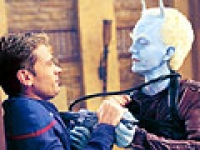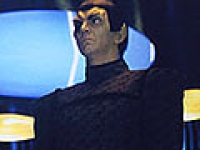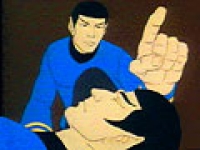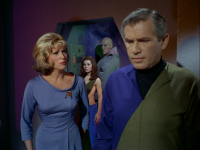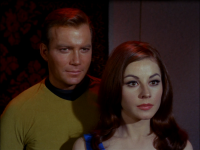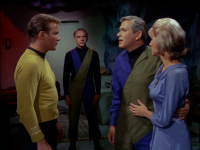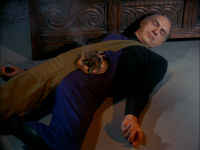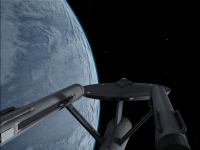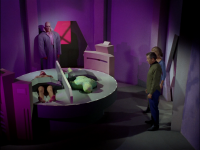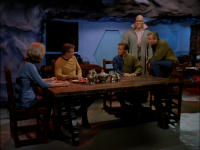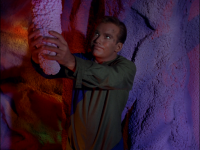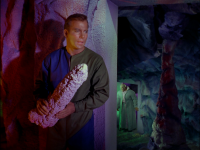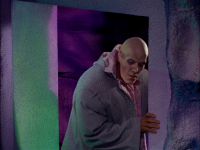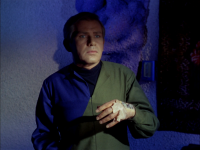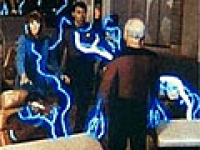Star Trek: Newest — 1x07 — Much Ado About Boimler
Synopsis
Mariner tries to impress her best friend from Starfleet Academy who is now a visiting Captain. Boimler is sent to a Starfleet medical ship after a transporter accident puts him "out of phase."
Remarkable scenes
- Mariner: "You're just excited to kiss a whole new butt, aren't you?"
- Boimler: "Wait, I'm still all phasey!" Rutherford: "Yeah, but you're not making the sound anymore which was the worst part, right?"
- The Division 14 Medical Specialist's creepy appearance.
- Mariner: "Maybe let's talk like after the giant space emergency?"
- The Division 14 Medical Specialist apologizing for his creepy demeanor.
Review
This is a strong offering. Everything in the episode was quite endearing except for Tendi's dog plot, which was more weird than funny. One quite distracting detail about that is it further compounds Star Trek's incredibly complicated relationship with genetic engineering, which has long been established to be banned in the Federation and yet we see it used from time to time anyway such as when Voyager's doctor used it to correct a birth defect in B'Elanna's baby though it was strangely not allowed to be used to cure Archer's father of a terminal illness. Tendi uses this banned or perhaps not quite so banned technology to create a brand new life form which aside from the problems of questionable legality based on past canon also raises moral questions as well that the episode doesn't deal with in at all a mature way. It seems at the very least morally questionable for Tendi to just cavalierly create a brand new sentient(!) life form using a nominally banned technology like some mad scientist creating some kind of Frankenstein monster and then just dump it on some random hospital planet because she clearly didn't know what she was doing. This is serious stuff that the episode treats entirely unseriously.
That said just about everything else about the episode was terrific. The main plot exploring Mariner's clear competence but total unwillingness to accept promotions by contrasting her with a former classmate who's the same age who made it to the rank of captain puts Mariner's personal problems into much greater focus. It was both touching and an important piece of character development to have it said out loud that many people expected Mariner would be a captain by now as well as her admission that she still has some stuff to figure out and she's not entirely sure who she wants to be; that she's still finding herself. This was nicely done; indeed there are many people in the world who are still finding themselves even decades after finishing school. Not everyone has a perfect career trajectory with unbroken upward mobility. Many if not most people zigzag all over the place throughout their lives with various ups and downs with their careers, personal lives, and subjective well-being.
Many smaller details were delightful as well. For instance, Captain Ramsey wasn't just a vehicle to deepen Mariner's character, but a charming character in her own right, as was her Vulcan sidekick Durga. The copious references to TNG: Chain of Command were nicely done too and one of the best details of the episode was the introduction of a new character of the same species as Arex from TAS, the tripod alien. The Division 14 Medical Specialist was beautifully animated in a way that there wasn't budget for on TAS. The writing and voice acting for his character were excellent as well, ultimately leading him to be a standout character nearly as strong as Ramsey. All things considered, this is one of the strongest episodes of the series so far. If the writers had avoided the unfortunate Tendi missteps, this could've been the strongest episode so far.
Star Trek: Newest — 1x07 — Nepenthe
Synopsis
Picard and Soji transport to the planet Nepenthe, home to some old and trusted friends. As the rest of the La Sirena crew attempt to join them, Picard helps Soji make sense of her recently unlocked memories. Meanwhile, Hugh and Elnor are left on the Borg cube and must face an angered Narissa.
Remarkable scenes
- Rios: "I'm tractor locked to a Borg cube full of Romulans!"
- Soji to Picard: "Whatever. None of this is real. Just get on with the mind game."
- Picard dropping in on Troi and Riker.
- Raffi to a panicky Agnes: "Gonna hook you up with whatever you need." Agnes: "Is it cake?" Raffi, not expecting that request: "...You bet it's cake!"
- Riker guessing the details of the mess Picard got himself into quite accurately.
- Troi trying to reach Soji, then Picard interrupting clumsily only to get shoved by Soji. Troi: "This isn't something a ship's counselor is supposed to say, but you had it coming."
- Hugh resolving to seize the Borg cube from the Romulans only to be summarily executed by Narissa.
- Agnes injecting herself with a neurotoxin.
- Riker: "What are they like, this new crew of yours?" Picard: "Well, I would have to say they are decidedly motley."
Review
This is a sappy, sentimental story that doubles down on catching up with old characters and definitely delivers on that front. In Maps and Legends Picard said with considerable grief in his voice that he had hoped to avoid involving any of his previous Enterprise colleagues in any of this because he didn't want any of them to end up like Data. That context makes Picard showing up at Riker's doorstep unannounced all the more moving. Indeed, the portrait of the Troi-Riker family we get in this episode steals the show, particularly the charming scenes between Soji and Kestra. Soji's PTSD and dissociation were understandable and portrayed well, as were Troi's efforts to provide counseling. There are also some interesting parallels between this episode and Ent: Cold Station 12. Here we are told Troi's and Riker's son died because the technology that could've cured his illness was included as part of the synth ban. In Ent: Cold Station 12, Archer tells Dr. Phlox that his father died because the ban on generic engineering precluded a cure. Hopefully these nuggets of nuance are building to broader and more direct social commentary on the ethics of banning whole categories of technology to prevent immoral uses of it.
The subplots of the episode were not as well put together though. The flashback to Commodore Oh's mind meld with Agnes was clearly meant to provide context for why she assassinated Maddox, but it doesn't quite get us all the way there. It's hard to believe seeing visions of Earth possibly being destroyed some time in the future by some nonspecific threat would be enough to get Agnes to murder a man that she loved because his work—which she deeply believed in as well—might possibly some day indirectly lead to those visions coming to pass somehow. The only way to rationalize this is to assume that the mind meld was more than just visions; that it was also a form of mind control as well. Notably Commodore Oh did not ask for consent before melding with her, making it hard to consider it anything other than something akin to a rape scene given that Star Trek has established quite clearly by now that mind melds are acts of the utmost intimacy. While the mind meld mind control explanation does indeed work quite well to make sense of Agnes' behavior, the story's narrative does not endorse this interpretation on screen explicitly, undermining the potential dramatic impact of her suicide attempt. Also of note, the fact that Commodore Oh can perform mind melds implies that she is either a Vulcan rather than a Romulan disguised as a Vulcan as it initially seemed, or perhaps more interestingly a Romulan who can perform mind melds. This too is not made at all clear though, unfortunately.
The most disappointing detail of the story though is the tragic waste of Hugh's character. Killing characters for dramatic effect can certainly be done tastefully and well. Icheb's death in Stardust City Rag was an excellent narrative choice. Icheb's character had already been fully actualized by that point in the story and he had been a Starfleet officer for more than a decade after arriving at Earth with Voyager. While it perhaps would've been fun to see some flashbacks of what his life in Starfleet was like before he was tragically murdered, his death served to deepen Seven of Nine's character in significant ways without wasting any significant character growth potential for Icheb. On the other hand, Hugh's death serves no useful purpose to the story except to gin up some cheap shock value now and some cheap revenge drama later. Plus had he lived, we could've taken some solace in knowing that he continued to do good work bringing former Borg back into the fold in the finest spirit of Star Trek. Sometimes a character surviving a story is a more powerful ending than a shocking death.
The weakness of the subplots isn't enough to drag the episode down too far though because the main story with Picard and Soji visiting the Troi-Rikers was immensely satisfying.
Star Trek: Newest — 1x07 — Magic to Make the Sanest Man Go Mad
Synopsis
As the U.S.S. Discovery crew attempts to let loose at a party, an unwelcome visitor comes aboard bringing about a problematic and twisted sequence of events.
Remarkable scenes
- Stamets: "You are astonishingly grounded for having endured seven months of torture!"
- Harry Mudd emerging from the Gormagander and shooting people.
- Mudd's rant to Lorca followed by his immediate suicide bombing of the ship.
- Mudd somehow kicking off a time loop.
- Stamets' inartful attempts to explain the time loop.
- Mudd: "There really are so many ways to blow up this ship. It's almost a design flaw!"
- The Mudd-kills-Lorca montage.
- Mudd belittling the unnamed bridge officer as "random communications officer man."
- Mudd getting tricked by Burnham and blowing up the ship in frustration to reset the time loop.
- Mudd being doublecrossed and reunited with Stella.
Review
This episode is an awkward attempt to rehash previous entertaining standalone time travel episodes like TNG: Cause and Effect or Voy: Relativity sandwiched in the middle of an otherwise totally serialized story. Let's do a time loop episode while Admiral Cornwell is a prisoner of the Klingons! Ugh. That said, for the most part this is a skillfully done rehash. And even more notably, Burnham's personal log at the start of the episode makes some things explicit that were left too vague in previous episodes. The most significant is the revelation that Stamets is indeed capable of piloting the spore drive sustainably now. Likewise, many on the crew have noted the changes in Stamets' personality, but largely don't think much of it or find it all that concerning. Ditto with many on the crew noting Tyler being surprisingly well adjusted for someone who spent seven months being tortured. It's important to have dialog making note of these things, lest the audience think the narrative intends to portray such things as unremarkable. Better late than never for the story to get around to that. It's still pretty annoying that they're not dealing with the whole evil-Stamets-in-the-mirror cliffhanger though.
The real star of the show this episode is Mudd. He was hilariously entertaining in nearly every scene he was in, which is a bit of a surreal thing to take in given that most of his scenes in past episodes (including his previous appearance in this series) were mostly cringeworthy. And while it is pretty annoying to have a largely filler episode right after the cliffhanger with Cornwell captured by the Klingons, one kind of weird silver lining about the otherwise awkward timing of this episode is that Lorca faces real consequences for abandoning Mudd despite not seeming to face any for abandoning Cornwell in a similar fashion. The way the narrative is structured this doesn't seem like an intentional irony, as nothing in the plot draws any attention to the parallelism whatsoever, but it was nevertheless fairly satisfying to see anyway. As was seeing Lorca die repeatedly.
The sheer force of Mudd's hysterical personality can't carry us through weak plot logic, however, and there was quite a bit of that here. For starters, Mudd's time loop device was quite an overwrought piece of technology. He reportedly acquired it prior to his imprisonment, as he had used it to rob a Betazoid bank. He then somehow reacquired it after somehow escaping the Klingons. He then somehow located an endangered space whale, somehow buried his ship inside it, and somehow positioned the space whale in the path of the Discovery. And as if all that weren't difficult enough to swallow, the time loop device itself was apparently a stable, reliable piece of technology and Mudd just so happened to be the first person to get ahold of it by virtue of encountering "a four dimensional race" who "perfected the technology" supposedly on Mudd's behalf. Seriously?
Another pretty weak moment was when Burnham confronted Mudd about her value as a hostage in an attempt to get him to loop time one more time. As she's discussing it all with him, she stands in front of a table full of those purple death balls easily within reach. Mudd then turns his back to Burnham, giving her ample opportunity to snatch one and assassinate him with it. Instead she waits until Mudd is much closer to the table and then much more riskily snatches them up while Mudd is watching and promptly kills herself instead of him. It's a powerful scene, and especially amusing given that Mudd kills himself out of frustration to reset the time loop immediately afterward, but there was no reason Burnham couldn't have just cut to the chase and taken Mudd out to accomplish the same goal, just as Stamets did in a previous loop. The scene perhaps would've been less entertaining that way, but it would've made a lot more sense.
In addition to those flaws, the second half of the episode is just generally a lot less charming than the first half. Instead of focusing on gradual, hilarious refinements to the time loop as TNG: Cause and Effect did, the story begins to lazily cut over most of Stamets explaining things to people over and over, better each time, and instead shows the crew magically becoming more informed with each time loop. By the time they reach the last time loop, Stamets has somehow found a way to organize a conspiracy against Mudd that involves several crew members acting in a coordinated fashion. It's hard to imagine how Stamets could've crammed all that prep of so many people into a five or so minute elevator pitch so effectively. It seems the writers couldn't imagine such a scene either, choosing instead to cut over it rather than try to write it.
On balance though this odd, mostly filler episode still succeeds in being more fun than it is flawed. And as a result is one of the stronger stories so far.
Star Trek: Newest — 1x07 — The Andorian Incident
Synopsis
When Archer and his crew pay a friendly visit to an ancient Vulcan monastery, they stumble into an interstellar conflict between the Vulcans and their militaristic rivals, the Andorians.
Remarkable scenes
- Archer and Tucker discovering an Andorian. Wow, the makeup on the Andorians is awesome!
- A Vulcan monk making a comment about how humans smell to T'Pol.
- Archer, committing a faux pas: "So if anyone has a suggestion, I'm all ears. No offense."
- T'Pol's reason for not cuddling up with Archer: "The cold is preferable to the odor."
- Archer's performance with the Andorians.
- Hoshi and Reed's officer expressing fear of the transporter.
- Archer discovering the hidden Vulcan base.
- Shran to Archer: "We're in your debt."
Review
Here's a small taste of the prequel we've been waiting for. A thoroughly underfeatured race from TOS, the Andorians, are given a bit of a backstory in this episode. Their reputation as being aggressive is upheld and they're not abused by being made into generic bad guys either. I'm not exactly happy that the Vulcans are turning out to be more and more evil, but it stands to reason that since the Andorians neighbor the Vulcans that these kinds of petty conflicts would ensue. Overall the episode was convincing. No major continuity issues this time. But the plot wasn't anything special. If it weren't for the plot twist at the end and the promise of some political intrigue as a result, I wouldn't have given this episode as high a rating. We've seen far too many hostage episodes before. I'm just glad this one had something of a purpose.
Star Trek: Newest — 1x07 — Eye of the Needle
Synopsis
Voyager discovers a deep space wormhole.
Remarkable scenes
- Crewman addressing Kes with his question: "Can this guy do everything a real doctor can do?" The Doctor referring to himself in the third person: "Yes, he can."
- Kes concerned with how rudely the doctor is being treated.
- The Doctor lamenting about people shutting him off, or forgetting to be turned off.
- Janeway's private chat with the Romulan, trying to convince him she is who she says she is.
- Torres discovering that it may be possible to beam through the wormhole.
- The Doctor discovering Kes' photographic memory.
- Voyager beaming the Romulan captain into the Delta Quadrant.
- Tuvok discovering that the wormhole leads to the Alpha Quadrant, yes, but twenty yeaes in the past.
- Tuvok revealing that he checked the history and that the Romulan captain died before he could have sent the crew's messages.
- The Doctor finally getting some respect.
- The Doctor: "I would like a name." He never gets one though...
Review
Voyager is continuing in its tradition of jumping the gun. A story about getting home was far too premature. They should have saved this up for late in the season, possibly even the finale! The reason is that the audience was 100% certain this wormhole would NOT lead to the safe arrival home of our characters. It's just too early! Even if you don't make this assumption from the beginning, it becomes more and more clear that the wormhole is a lost cause. First it's too small, then there's Romulans on the other side, then they want to beam through the wormhole? Abandon Voyager? Sorry. Didn't have me fooled for a minute. That said, it's still a good episode and I enjoyed watching it, even if was predictable and premature. One high point is how the doctor is finally getting some respect. I like how it took a while for him to get it though. And it's nice that it took an outsider, Kes, to get everyone to realize that the Doctor and Data from TNG are the same concept. Artificial life is no less life, and the Doctor, just like Data, is a remarkable creation by man which should be respected as a person, not as a slave. A very good episode.
Star Trek: Newest — 1x07 — The Infinite Vulcan
Synopsis
While visiting a new planet Sulu is poisoned and Spock becomes cloned by the Phylosians, a plant-like species.
Remarkable scenes
- Kirk: "Beam us up, Scotty!" Another very close line to the famous and much parodied but never actually uttered, "Beam me up, Scotty!"
- Spock reciting the philosophy of the IDIC.
- Kirk: "Any chance of teaching me that body throw?" Sulu: "I don't know. It isn't just physical you know; you have to be inscrutable." Kirk: "Inscrutable? You're the most scrutable man I know!"
Review
This episode is completely pointless. It tries to make a point about how creating a master race is bad, but the ridiculousness of the plot blasts away any profound messages that it attempted to convey. We're not given any explanation for why Keniclius or Spock were so huge, the plant aliens were interesting but ultimately served no purpose, and Keniclius' goal of creating a peacekeeping army was pointless seeing as how starfleet is essentially just that. In the end, Keniclius gives up way too easily; or should I say not soon enough because his motives were so blurry? Only small details in this episode redeem it, such as Spock's recital of the philosophy of the IDIC and the reference to the Eugenics war of 250 years ago.
Star Trek: Newest — 1x07 — What Are Little Girls Made Of?
Synopsis
Nurse Chapel's long lost fiance is found.
Filler rating: bad filler
Pretty lame episode with no significant long term continuity. Dr. Soong on Star Trek TNG will later (re)invent androids, but it is presumed that his work occurs in isolation with no connection whatsoever to Dr. Korby's discoveries.
Remarkable scenes
- Kirk killing an android.
- Kirk being "cloned" into an android.
- Kirk debating with his android counterpart.
- Android Kirk calling Spock a half-breed.
Review
While it's annoyingly unoriginal to frame another episode around a Kirk double and another guest star with a hidden agenda, I quite liked Kirk's method of making Spock aware of the impostor by filling his thoughts with hate for Spock during the creation of the Kirk android. Kirk couldn't have known for sure that his tactics would work, so the entire attempt was just one big lucky guess. Nevertheless, that sort of boldness is exactly what makes a good captain.
However, the real meat of the episode lies with Dr. Korby's discovery of technology from an extinct alien civilization capable of manufacturing androids. This technology is even capable of transferring the human consciousness into an android, a capability that he uses to save his life, after which he apparently makes no attempt to contact Earth because he's afraid that his people would find his discovery somehow distasteful. This seems like an irrational notion up until the point when the Enterprise arrives and Kirk and Chapel seem to validate Dr. Korby's irrational fears by reacting with horror at the very idea that Korby has created androids. Kirk even compares him to Hitler at one point without much of a reason.
At about 32 minutes into the episode Korby proposes seeding androids incognito to Earth and its colonies in secret as a means to avoid what he believes would be mass hysteria if their existence were to be widely known. But rather than relieve Korby of his paranoia by explaining to him that that would be unnecessary and that Earth would welcome him, his discoveries, and his android counterparts into the fold, Kirk spends the entire episode overreacting to Korby's overreaction. The ensuing conflict results in the deaths of everyone on the colony and then Kirk goes about his merry way as if nothing of consequence has occurred.
In so doing, the implications of the existence of this android technology are wasted and forgotten. Kirk makes no attempt to retrieve or preserve the technology and the episode itself seems to condemn the very existence of such a technology. At several points, the episode goes out of its way to make the argument that an android which thinks it's superior to a human is a threat which must be destroyed. The episode also demonstrates that the androids were emotionally unstable and not very good critical thinkers, seeing as how Kirk was so easily able to exploit conflicts between their emotional states and their programming. While it's clear the technology has flaws, none of this is enough to support the episode's apparent condemnation of the very idea of androids.
Instead what I can only assume the episode intended us to believe is that Korby was lying to Kirk and that his real intent was to replace key personnel on Earth and its colonies in order to take them over. This is certainly a possibility, given the Kirk double and Korby's admitted desire to keep his discoveries a secret, but at no point in the episode does this premise become conclusive. At best, Kirk could only have a reasonable suspicion of Korby intending to do such a thing and it was as irresponsible for Kirk to act on such a suspicion without proof as it was for him to make no effort to preserve or retrieve any of the technology found on that planet for further study. Overall a pretty lackluster episode.
Star Trek: Newest — 1x07 — Q-Less
Synopsis
Frequent U.S.S. Enterprise visitors Q and Vash introduce themselves to the crew of Deep Space Nine, while the officers struggle to save the station from imminent destruction.
Filler rating: good filler
There's no essential plot or exposition in this episode that renders it unskippable, but it's a decent episode, even though it could have been better.
Remarkable scenes
- Bashir telling the story of his medical finals.
- Vash and Q appearing.
- O'Brien explaining what he knows of Vash's relationship with Picard.
- Vash to Q: "You're arrogant, overbearing, and you think you know everything." Q: "But I do know everything!" Vash: "That makes it even worse!"
- Quark ignoring the weirdness of being transported about by Q due to his strong desires to do business with Vash.
- Vash sexually arousing Quark.
- Q toying with Julian.
- O'Brien's reaction to seeing Q: "Bloody hell."
- Q to Sisko: "Is Starfleet penalizing you, or did you actually request such a dismal command?"
- I like the inside joke about the uniforms. Q: "I like your new tailor." He then magically switches from the TNG uniform to the DS9 uniform. :)
- The conversation between Quark and Odo regarding Odo eavesdropping on him. Quark: "What were you this time? The table? One of the chairs? The wine bottle!" Odo: "When are you going to realize that you have no secrets from me?" Quark: "I have nothing to hide. I'm selling quality merchandise to select clientele." Odo: "And what makes them so... select." Quark: "They're all ridiculously wealthy. And not too bright." Odo: "I'll never understand this obsession with accumulating material wealth. You spend your entire life plotting and scheming to acquire more and more possessions until your living areas are bursting with useless junk and then you die. Your relatives sell everything and start the cycle all over again." Quark: "Isn't there anything you desire?" Odo: "I have my work. What more do I need?" Quark: "A suit of the finest Andorian silk. A ring of pure sorax! A complete set of Tenaish pottery. How about a latinum plated bucket to sleep in?" Odo seemed tempted by the last one. ;)
- O'Brien to Q: "O'Brien. From the Enterprise." Q: "Oh yes, weren't you one of the little people?"
- Q mentioning that the station is "hurtling toward its doom" to the auction crowd.
- Julian having slept through the whole episode thanks to Q.
- Morn appearances; 1. Can be seen walking behind Vash and Sisko during their first meeting. 2. Behind Quark when he tries to convince Vash to sell him her artifact at an absurdly low price. 3. In the crowd when Q creates a boxing match between himself and Sisko. 4. In Quark's Bar when Vash is leaving in the end of the episode.
Review
Certainly a bonus to bring back Vash and Q, further tying the series to TNG, yet allowing us to see that it can stand on its own against TNG villains. This episode bears a resemblance to TNG: Encounter at Farpoint. Both episodes featured Q, both episodes featured a trapped alien being exploited, both episodes ended in the release of that alien as a puzzle for the Starfleet crew to solve, and both episodes ended with Q being proven wrong. The repercussions of this episode are of course not as grand as Farpoint's, but it is nevertheless a fun episode, even if it gets annoying waiting for the crew to solve the painfully obvious puzzle at times.
Star Trek: Newest — 1x07 — Lonely Among Us
Synopsis
Alien beings take control of Crusher, Worf and Picard.
Filler rating: good filler
There's no essential plot or exposition in this episode that renders it unskippable, but it's a decent episode, even though it could have been better.
Remarkable scenes
- Data mimicking Sherlock Holmes.
- Picard's creepy behavior while possessed.
- The senior officers plotting a mutiny.
Review
This episode is like a less good version of TOS: Journey to Babel. Instead of rehashing that terrific episode, the more interesting story about the conflict between the two alien delegations is largely ignored so we can have yet another energy life form of the week.
There is a scene early on that about perfectly sums up the level of effort put into conceptualizing this story: when Worf freaks out while receiving medical attention, Beverly asks the injured crewman who tried to help restrain him, "Are you okay?" He never responds and doesn't move much but she doesn't seem to care. She's on autopilot helping Worf. She only pays lip service to that minor character over there.
That's how we should imagine the writers felt about this episode too. It's like they were on autopilot repeating the tired energy life form formula ad nauseam and like Beverly being too checked out to pay any real attention to her comrade, the writers were too checked out to pay any real attention to the subplot.
This story isn't without its charms though. Picard possessed was highly entertaining, as was Data's goofy embrace of Sherlock Holmes. It's a shame they didn't let the two alien delegations be the main plot instead of the subplot. Having Data put on the Sherlock Holmes persona to solve a conventional murder would've been a much more fun episode.



